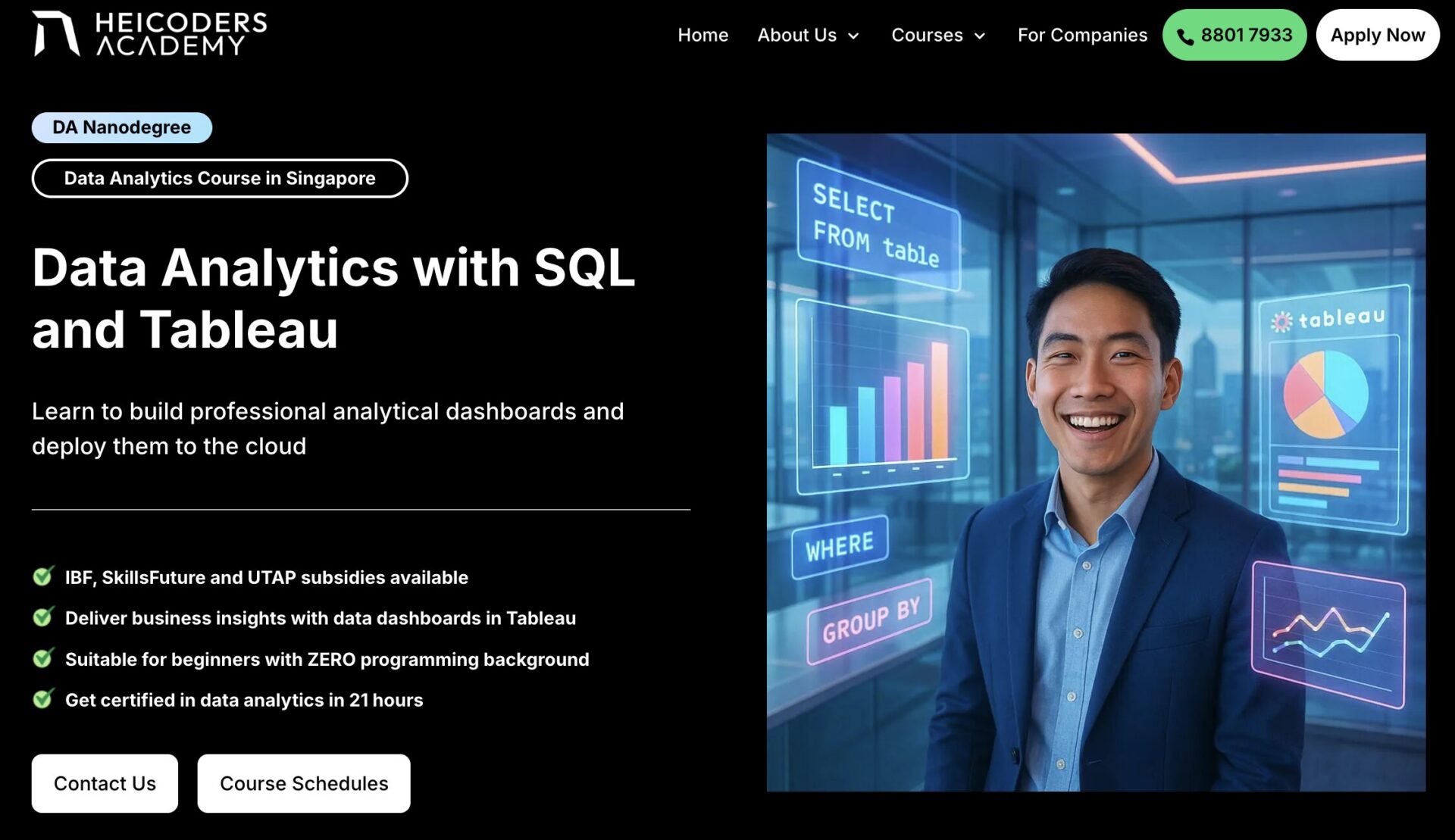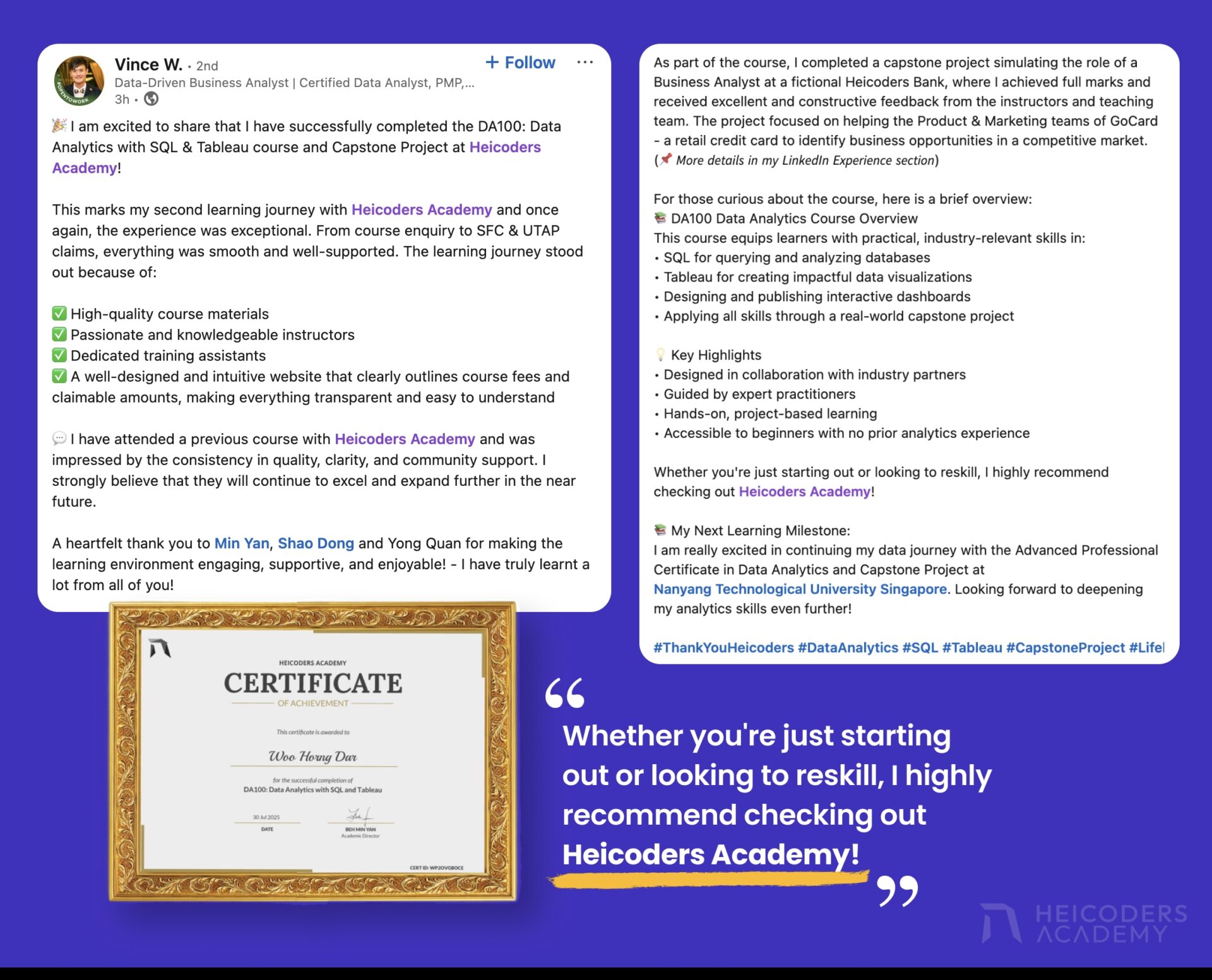Blog > Data Analytics > Data Analytics Course vs Self-Study: Which One Suits You Better?
Data Analytics Course vs Self-Study: Which One Suits You Better?
In 2025, data skills aren’t just “nice to have”, they’re the backbone of decision-making across Singapore’s industries. From government initiatives to financial services and e-commerce, data analytics roles are booming, and the demand isn’t slowing down.
If you’re thinking about picking up data skills, you’ve probably asked yourself:
“Should I self-study… or invest in a course?”
It’s a fair question, and one that deserves a thoughtful answer.
This article dives into both paths, breaks down what actually matters in the Singapore job market, and helps you decide which path makes sense for your goals.
The Appeal of Self-Study: What Works and What Doesn’t
Let’s start with the DIY route. The self-study option is tempting for many reasons:
- It’s cost-effective, often free
- You control the pace and schedule
- The internet is flooded with resources: YouTube tutorials, Coursera, Udemy, blogs, podcasts, the list goes on
If you’re just exploring data analytics casually, this can be a great starting point.
But here’s what many don’t realise: Learning alone is easy. Progressing alone is hard.
Here’s what tends to go wrong:
- Information overload. You bounce between 10-tab rabbit holes on SQL, Tableau, and Python, without a clear progression.
- No feedback loop. You follow tutorials, but no one tells you if you’re doing it right, or efficiently.
- Lack of real-world context. You might learn how to use Tableau to visualise coffee sales in Seattle, but have no idea how analytics works in a Singapore SME or gov board.
- Portfolio paralysis. You complete exercises, but struggle to build projects that actually demonstrate business impact (a must for interviews).
Self-study is great for curiosity. But without structure, it often leads to frustration, doubt, and burnout.
What a Good Data Analytics Course Should Really Offer (That Self-Study Can’t)
Now let’s flip the coin.
A good course isn’t just about delivering content, it’s about accelerating your learning curve and preparing you for real-world work.
Here’s what strong courses do that self-study can’t replicate:
✅ Structured learning path. You go from beginner to intermediate in a deliberate, step-by-step way, without guessing what to learn next.
✅ Guided, hands-on projects. You’re not just watching, you’re doing. Writing SQL queries, building dashboards, interpreting real data.
✅ Singapore-relevant case studies. You learn how analytics applies to local industries, from campaign analysis in marketing teams to ops dashboards in logistics companies.
✅ Instructor support. Stuck? Confused? You’re not alone. Good courses offer timely help and feedback from experienced practitioners.
✅ Career support. Some courses help you polish your resume, review your portfolio, and prep for interviews, all tuned to the SG job market.
What You Might Miss with Self-Study
Imagine this:
You learn SQL syntax from YouTube. Great. But can you…
- Write a query to segment customer cohorts by signup channel?
- Connect SQL logic to a real business question your boss might ask?
- Optimise the query so it runs on a real production database?
These are the kinds of nuances that often don’t show up in free content, but make or break your confidence and performance in a real job setting.
Singapore Context: What Employers Actually Value
Let’s get specific.
In Singapore, employers do respect self-starters, but only if there’s substance behind the effort. Here’s what hiring managers really look for:
🧠 “Can you apply data tools to solve actual business problems?”
📊 “Do you have project experience, not just certificates?”
🧰 “Can you use tools that our team uses, like SQL and Tableau?”
They don’t expect you to be a wizard on Day 1. But they want to see signs that you’ve been taught how to think like a data analyst; how to frame questions, spot patterns, and tell a story with data.
In this context, a well-regarded course, especially one that’s approved by SkillsFuture and IBF or backed by industry practitioners, can give you a clear edge.
Data Analytics Course vs Self-Study: A Decision Framework Based on Your Goals
There’s no one-size-fits-all. Here’s a practical way to decide:
👀 Scenario 1: “I’m just exploring.”
You’re data-curious but unsure if this is for you.
✅ Self-study is a good first step. Watch YouTube tutorials, try a few Coursera classes, dip your toes in.
⏳ Scenario 2: “I want to switch careers within 6–12 months.”
You’re serious, and time matters.
✅ Take a structured course. You’ll save months of guesswork and get job-ready faster.
🔄 Scenario 3: “I’ve self-studied, but I’m stuck.”
You’ve tried solo learning but can’t progress beyond theory.
✅ A course helps you break through. Especially with projects, mentorship, and application-focused learning.
🔍 Scenario 4: “I’m in marketing/ops and want to upskill.”
You already work with data, just not formally.
✅ A course bridges the gap. Learn how to run analyses, build dashboards, and interpret metrics like a data pro.
What to Expect from a Well-Designed Data Analytics Course in Singapore
Not all data analytics courses are created equal. The best ones don’t just teach tools, they teach how to think like a data analyst in real-world scenarios, especially within the Singapore context.
So, what should you expect from a course that’s actually worth your time?
✅ A clear and progressive learning path.
Good courses are structured to take you from fundamentals to applied skills. You shouldn’t have to guess what to learn next or how deep to go. Each lesson builds on the previous one with increasing complexity, helping you gain confidence, not confusion.
✅ Hands-on projects with real datasets.
It’s one thing to watch a demo. It’s another to get your hands dirty building dashboards, writing SQL queries, and drawing insights from messy datasets. Practical assignments should mirror challenges analysts face in real business settings.
✅ Local relevance.
Courses designed for a global audience often miss nuances specific to Singapore. A strong course should incorporate local use cases such as analysing sales performance for a retail chain in the heartlands, or designing dashboards aligned with KPIs used by local SMEs and agencies.
✅ Access to instructors and mentorship.
When you’re stuck, Googling isn’t always enough. Having access to practitioners who can provide guidance and context is a huge differentiator especially when you’re learning something as layered as analytics.
✅ Feedback and portfolio development.
Your final projects shouldn’t be left to chance. High-quality courses guide you in refining your work, ensuring your portfolio isn’t just “done”, it’s employer-ready.
What Sets Heicoders Academy’s Data Analytics Course Apart?

Let’s talk specifics.
If you’ve decided a course makes sense, you want one that’s practical, locally relevant, and built for working adults.
This is where Heicoders Academy’s Data Analytics with SQL & Tableau course shines:
- 🗓️ 7-week format — designed for working professionals to keep up without burnout
- 🛠️ Project-based learning — no fluff, just real tools and real datasets
- 🇸🇬 Localised content — instructors from Singapore-based tech teams teach what actually gets used here
- 📈 Portfolio development — build work that speaks directly to hiring managers
- 🎓 SkillsFuture, IBF & UTAP subsidies available — meaning lower out-of-pocket cost
- 👥 Small cohort sizes — get personal attention and feedback
It’s not a bootcamp. It’s not a MOOC. It’s a focused, practical course designed to get you confident and job-ready, without quitting your job.
Final Thoughts: It’s Not Just What You Learn, But How You Learn
In today’s world, you can learn anything, but you can’t always learn it well on your own.
Data analytics is more than just syntax and charts. It’s about learning how to ask better questions, find insights, and communicate them clearly. That requires more than scattered tutorials, it requires structure, feedback, and context.
So, is a course worth your time?
If you’re serious about pivoting into data analytics, and you value clarity over chaos, yes – it probably is.
Whatever path you choose, make sure your learning aligns with your ambition.
The data economy isn’t waiting. Why should you?

Upskill Today With Heicoders Academy
Secure your spot in our next cohort! Limited seats available.


